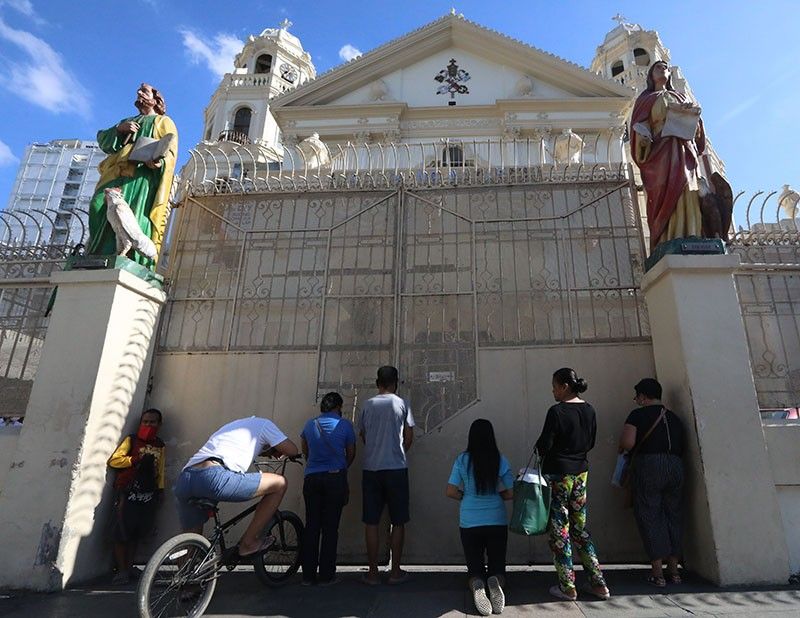Commentary: Whole-of-nation approach to COVID-19 pandemic

Regardless of age, gender, nationality and socio-economic stature, no one is invulnerable from acquiring the virulent coronavirus disease (COVID-19).
The World Health Organization declared the coronavirus outbreak a pandemic last March 11, 2020. In order to fight the pandemic, the WHO recommends that countries across the world must take a comprehensive approach that will isolate, test, treat and trace as many cases as possible. It was recommended that the test and trace strategy “must be the backbone of the response in every country.”
In the Philippines, in order to contain the spread of the virus, the government declared an “enhanced community quarantine” (ECQ) to the entire island of Luzon. The implementation of the quarantine started on March 17, 12 a.m. and is expected to last until the midnight of April 13, 2020.
Based on the recently released quarantine’s operational guidelines, all household members will observe strict home quarantine and movement will only be limited to accessing basic necessities. And, among those who are exempted from the quarantine are the members of the Philippine National Police, Armed Forces of the Philippines, Philippine Coast Guard and health and emergency frontline workers.
Frontline workers, as defined in the issued guidelines, are 1) public health workers which includes all employees of the Department of Health, DOH hospitals, hospitals of local government units, and provincial, city and rural health units; 2) private health workers such as, but not limited to, medical professionals, hospital administrative staff, and aides from private health facilities as well as and their service providers and 3) health workers and volunteers of the Philippine Red Cross and the WHO.
Being exempted to the stringent quarantine measures means that they are duty bound to perform their tasks on this emergency situation. Depending on the type of work performed, some will require potential interactions with infectious people or work in an already contaminated environment. Hence, the use and practice of appropriate measures will protect them from exposure that may eventually result into possible infection.
A few days ago, it was reported that there were appeals from frontline workers in health facilities that they are in dire need of support and supplies. Apparently, there is a local shortage of personal protective equipment (PPE) – face masks, gowns, visors, hoods, gloves and shoe covers, which is much needed in hospitals.
Based on reports, this urgent call came after a 27-year-old doctor who was treating a COVID-19 patient tested positive in Quezon City. The case was followed by the immediate quarantine of 39 personnel of the Philippine Heart Center, composed of doctors, nurses and other staff, after they were exposed to a patient who died due to the coronavirus disease.
In this regard, many private and academic institutions, foundations, and international and local non-government organizations responded positively and raised funds to fulfill the needed support of these ailing hospitals. They know that providing the much-needed equipment will ensure the protection and welfare of health workers to continuously perform their tasks in controlling the spread of infection.
For the private sector, big companies have just announced the full release of their workers’ salaries and are calling on others to do the same.
In particular, the Ayala Corporation and the Metro Pacific Investments Corporation (MPIC) have announced measures to tide over their employees during the quarantine.
Ayala’s chair and chief executive officer, Jaime Augusto Zobel de Ayala and its president, Fernando Zobel de Ayala, in their joint statement, announced a P2.4-billion emergency response package to pay the wages, bonuses and leave conversions of Ayala Group employees, as well as offset the revenues that would be lost due to loan deferments during the quarantine period. There are 27 Ayala-owned malls in Luzon that have been shut down under the quarantine.
The corporation’s emergency response package will consist of the following: 1) P600 million in salary continuance for displaced workers from construction sites of Makati Development Corporation and from the shuttered malls and retail spaces of the Ayala Malls, 2) P270 million for Globe Telecom retail store support staff and vendor partners, 3) P130 million for personnel-related financial support in all other Ayala companies and 4) condonation of P1.4 billion in rental fees from mall tenants who are not allowed to operate from March 16 to April 14, 2020.
Meanwhile, Manuel “Manny” Pangilinan, chairman of MPIC, announced that the group’s employees will be receiving the following: 1) advanced 13th month pay in full for PLDT, Smart and Meralco employees, 2) continuation of salaries and benefits of all employees, 3) vacation and sick leave credits will not be used, 4) 500,000 vitamin tablets for employees, especially for field personnel and 5) work from home arrangement. Pangilinan will also be helping frontliners in the campaign to slow the spread of COVID-19 by donating an initial 4,000 liters of alcohol from Roxas Holdings to government hospitals and MVP Group hospitals.
Truly, the COVID-19 pandemic entails a whole-of-nation approach to mitigate the crisis and such is utterly demonstrated by the bold and unprecedented cooperation between the public and private sectors.
All of us have something to contribute and it’s not just resources that we will need. Gestures of kindness and avoiding contaminating behavior as if we already have the virus will go a long way in stopping this contagion.
Alvin Manalansan is fellow at think tank Stratbase ADR Institute and convenor at CitizenWatch Philippines.
- Latest





























